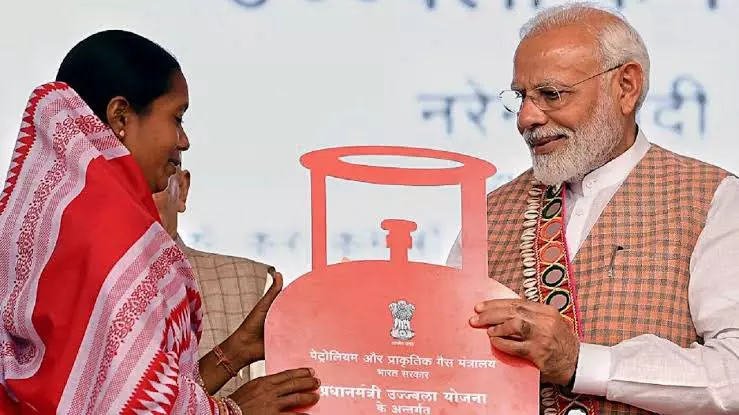
Ujjwala scheme: Poor families not benefiting, Parliamentary panel recommends higher LPG subsidy
The Pradhan Mantri Ujjwala Yojana (PMUY), one of Prime Minister Narendra Modi’s flagship schemes aimed at freeing poor families from smoke-filled kitchens, offers LPG connections with a subsidy of Rs 300 per cylinder

The Parliamentary panel on Petroleum and Natural Gas has recommended increasing the subsidy on LPG cylinder refills to make them more affordable under the Pradhan Mantri Ujjwala Yojana (PMUY) scheme. But the ministry has declined to accept the recommendation, prompting discontent from the committee.
The scheme aims to provide affordable cooking gas connections to low-income households.
Panel pushes for higher LPG subsidy
The committee, chaired by Sunil Dattatray Tatkare, expressed disagreement with the reasons cited by the Ministry of Petroleum and Natural Gas for not enhancing the subsidy. The committee tabled its report in Parliament, highlighting its discontent.
Also read: Anganwadi workers, children from PM Cares centres to be special guests at Red Fort on I-Day
While acknowledging the need to keep the government’s fiscal burden in check, the committee emphasised that expanding the reach of the Ujjwala scheme is equally important to fulfil its true purpose. It suggested that eliminating fake LPG connections could lead to substantial savings within the scheme itself. Given this, the committee has once again urged the ministry to increase the subsidy amount in order to ensure broader coverage under PMUY.
12 subsidised cylinders annually
The panel had earlier advised the ministry to increase the subsidy amount to ensure that the full benefits of the Ujjwala scheme reach poor households. It noted that the average refill rate under PMUY is only 3.95 cylinders per year —significantly lower than the 6.5-cylinder average for non-Ujjwala users.
According to the panel’s report, increasing the subsidy to Rs 300 per refill helped improve refill rates from 3.01 in 2019-20 to 3.95 in 2023-24. However, this is still far below the government’s stated goal of 12 subsidised cylinders per beneficiary annually.
Consumers not receiving scheme’s full benefit
The committee acknowledged that the scheme has positively impacted the lives of rural women. However, the low refill rates indicate that many beneficiaries are not reaping its full benefits. The panel called on the ministry to investigate the causes behind the low refill rate and consider increasing the subsidy so that poor families can afford regular refills. This, in turn, would improve both refill rates and the scheme’s overall reach.
What ministry said
In response, the petroleum ministry noted that per capita LPG usage among Ujjwala beneficiaries increased from 3.01 in 2019-20 to 3.95 in 2023-24, and further to 4.4 based on usage data from April-December 2024.
The ministry claimed this uptick reflects growing affordability of LPG refills for Ujjwala consumers. However, it stressed the need for behavioural changes among beneficiaries to ensure sustained use post-connection. It added that such shifts in traditional and rural societies require time and continuous effort.
The ministry also pointed out that traditional cooking preferences are tied to taste and flavour, easy availability of free firewood in hilly, rural, and forested areas, and longstanding cultural beliefs act as barriers. While acknowledging that refill prices are a key concern, the ministry said they are not the sole reason for low refill rates. It argued that raising the LPG subsidy would impose a significant financial burden on the exchequer.
Nonetheless, the Parliamentary committee remained unconvinced by the ministry’s arguments. It reiterated its recommendation to raise the subsidy amount on PMUY cylinders so that low-income families can afford timely refills with ease.
(This article was originally published in The Federal Desh)

